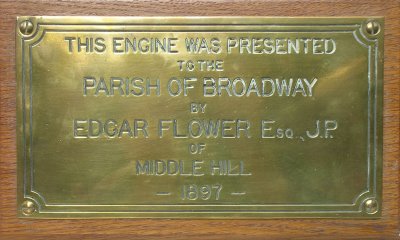|
The
Broadway Brigade 1897-1933, A Summary
|
|||||||||||||||||||||||||||
|
During
the first thirty-six years of the Broadway Brigade's existence fire
fighting in rural areas was still, as it always had been, very much
a community effort. The Broadway brigade was typical of the many part-time
and volunteer brigades throughout the Country.
The
standards of these brigades varied widely, some being better equipped
than others. The money available to them depended on local interest,
and sometimes on the generosity of wealthier members of the community.
There was no legislation which compelled any local authority to provide
and maintain a fire service. Many parishes, therefore had no service
at all. The Broadway brigade was administered from it's formation in
1897 until 1933 by the Lighting and Watching Committee, a sub committee
of Broadway Parish Council. All matters relating to the brigade, however
trivial, were discussed by them. All expenditure, including repairs,
maintenance, and the purchase of new equipment had to be approved by
the committee, and the captain of the brigade reported directly to them.
|
|||||||||||||||||||||||||||
|
|||||||||||||||||||||||||||
|
The
Evesham Journal in its account of a fire at Kilsant House in 1923 reported
a prompt turnout by the Broadway brigade. But, on reading the report,
a local who had witnessed the incident is said to have commented, "A
prompt turnout indeed, two of them, one drunk and the other sober!"
Unfortunately it is just this type of incident which is remembered,
whilst the effort needed to maintain morale and enthusiasm amongst a
part time crew, working with ageing equipment, is forgotten.
|
|||||||||||||||||||||||||||
|
|
|||||||||||||||||||||||||||
